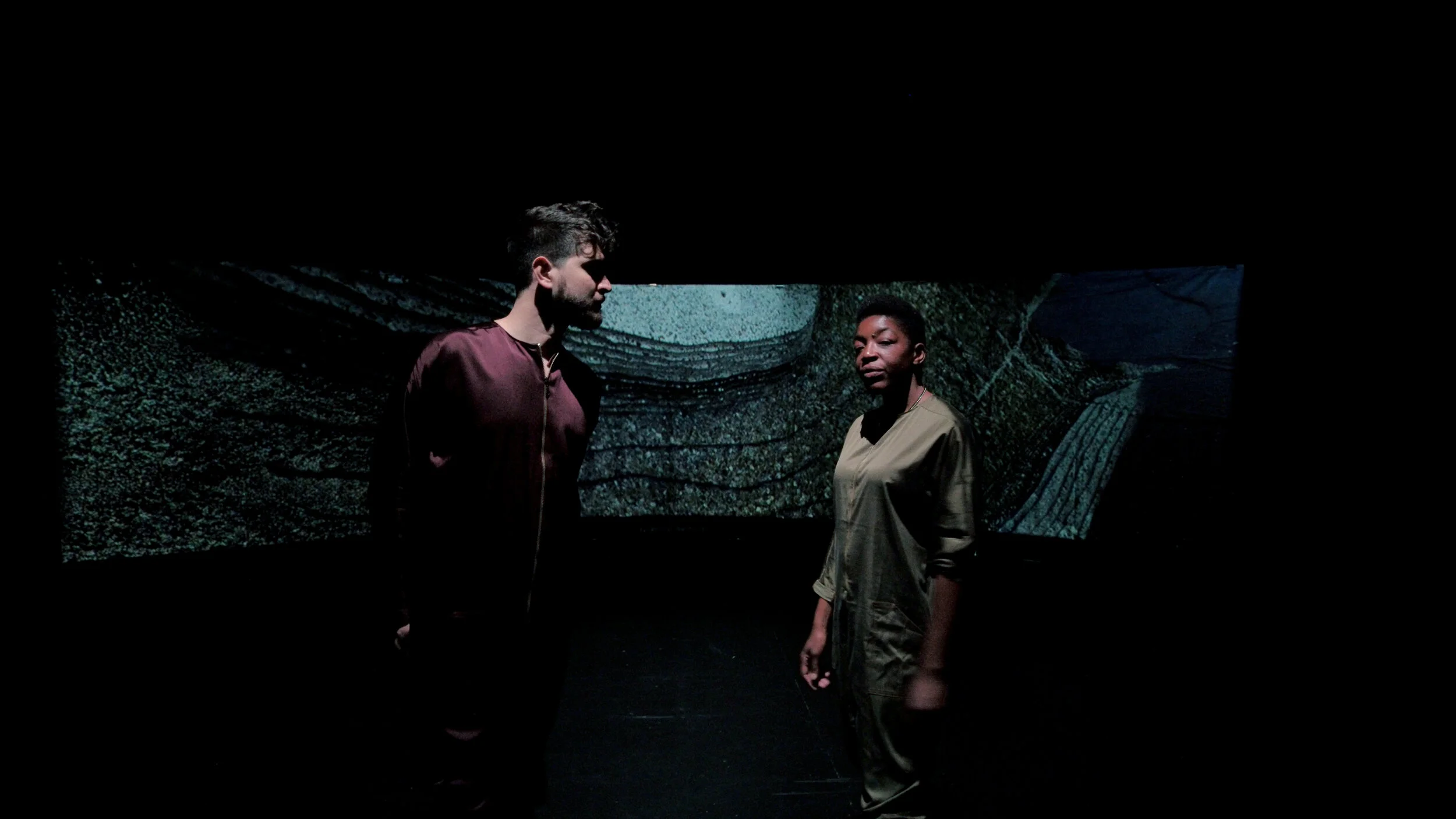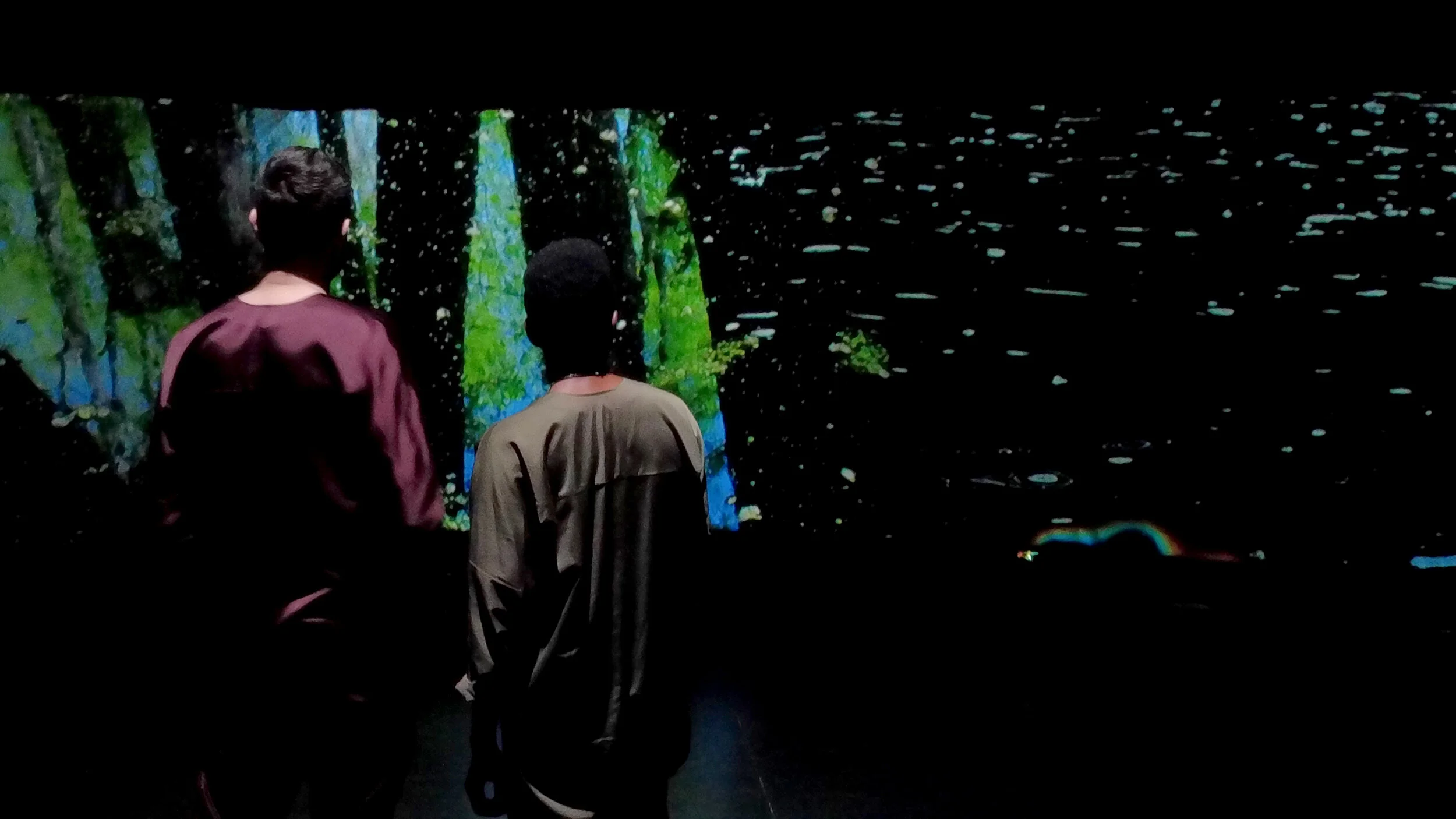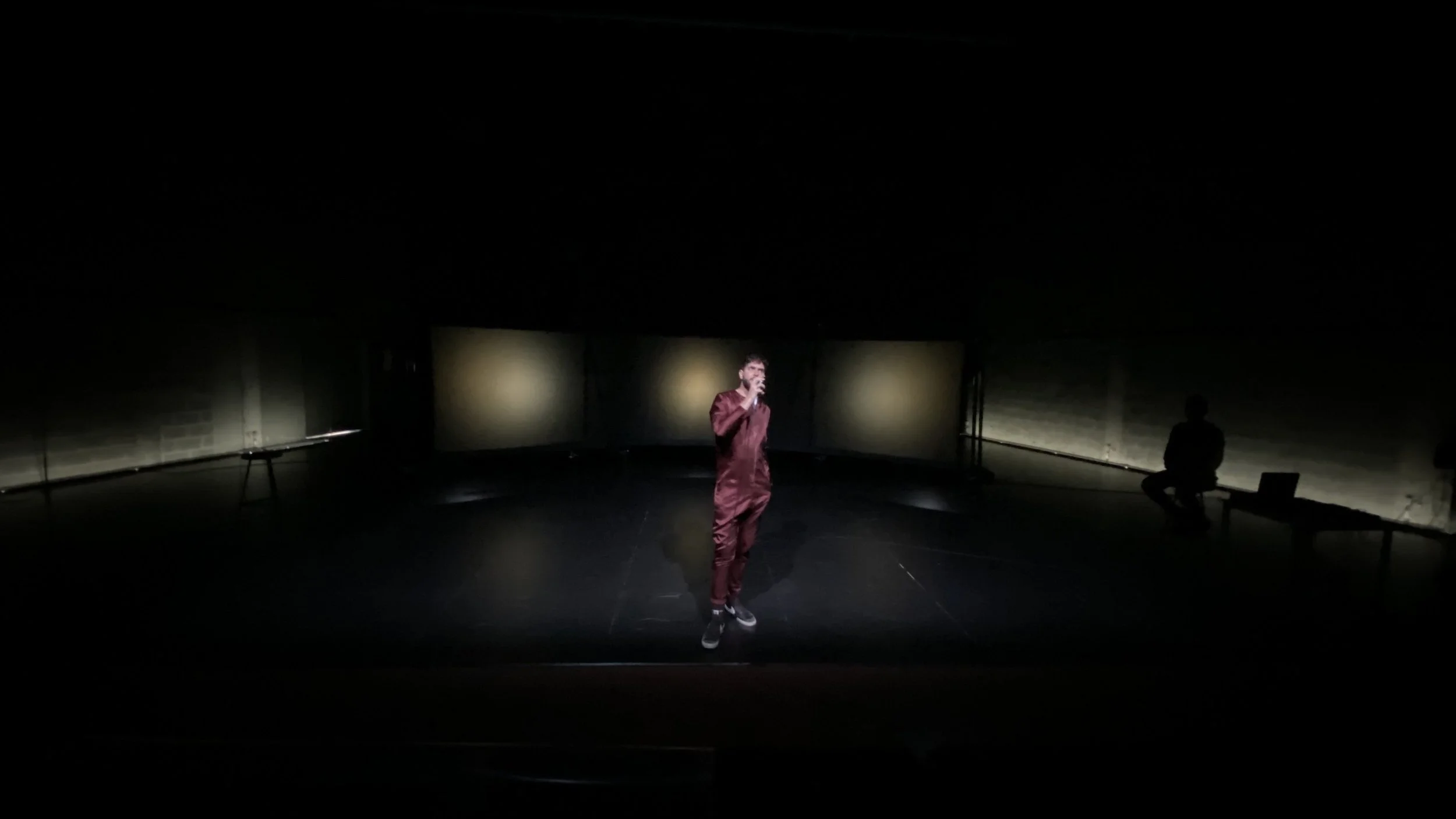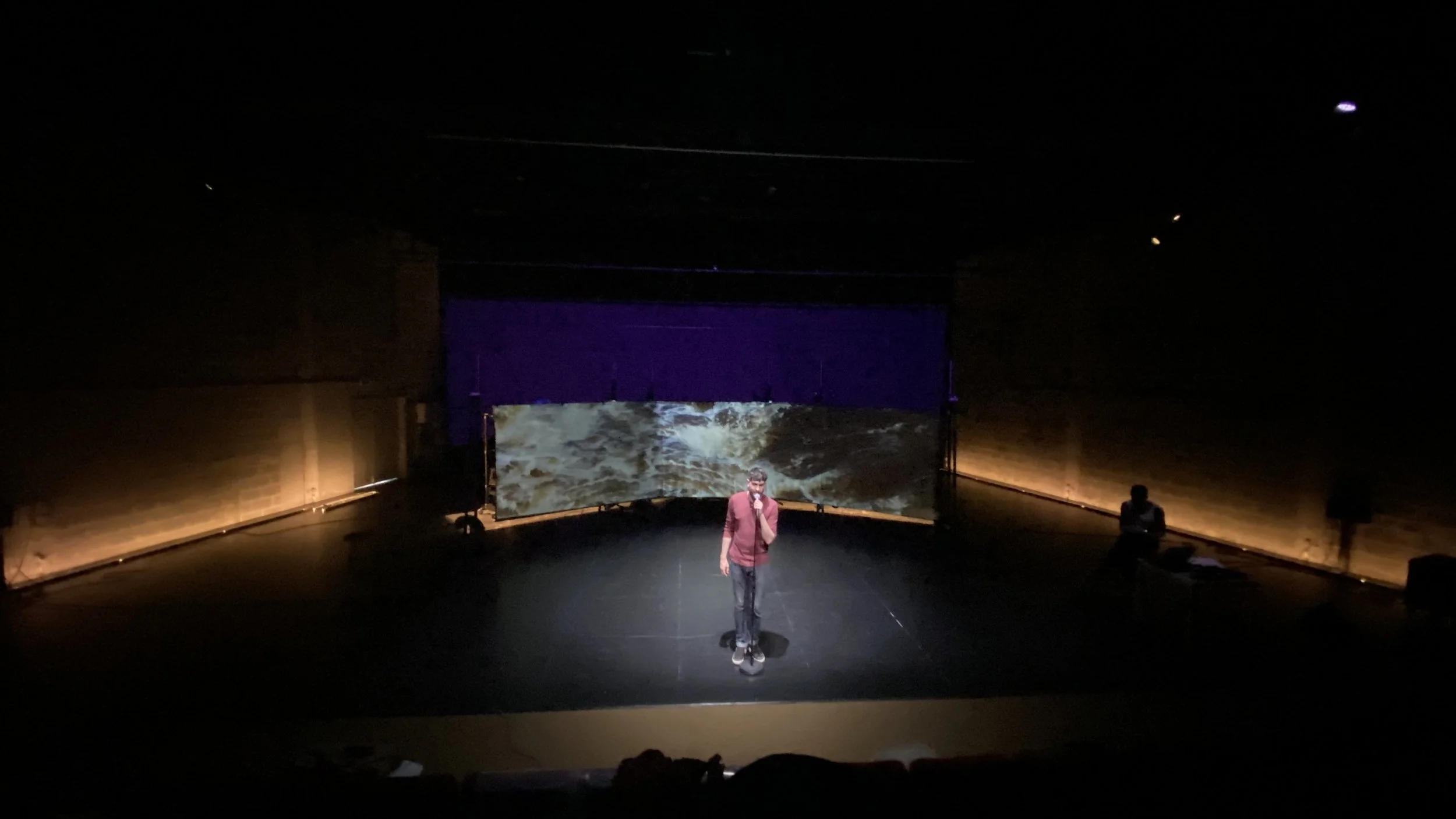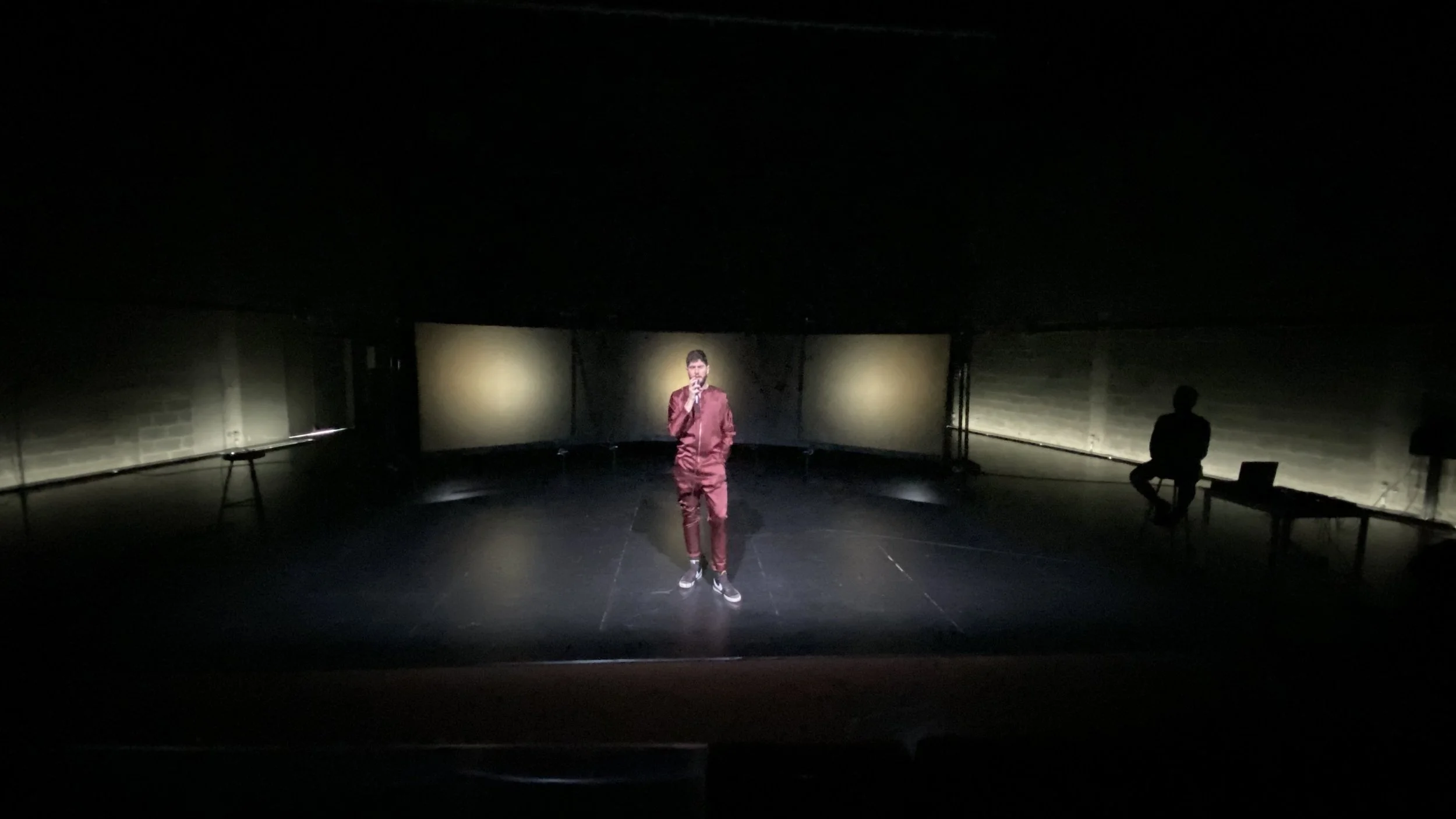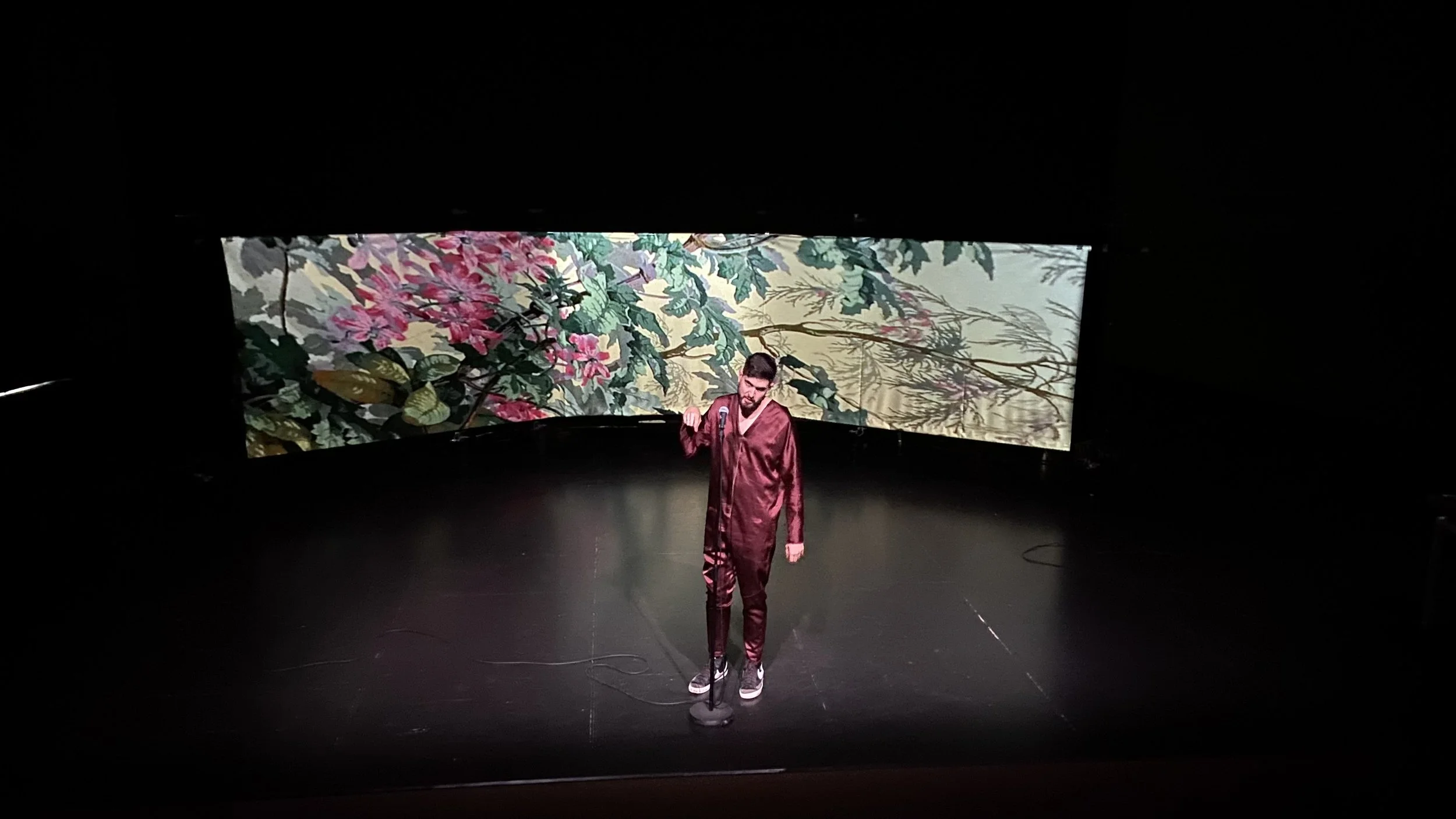MississipiS
MississipiS retrace l’expédition d’un groupe d’artistes et de scientifiques européens en canoë sur le Mississippi, explorant l’impact humain sur les paysages traversés. Alliant récits, figures emblématiques et musique interprétée par Délie, ce projet interroge les transformations écologiques et humaines du fleuve à travers une scénographie immersive. J’ai conçu la scénographie, les lumières et le dispositif vidéo, intégrant des matériaux réemployés et un écran panoramique unique. Ensemble, ces éléments ont créé un espace fluide et écoresponsable, où les projections d’images du voyage dialoguent avec les récits, offrant une réflexion poétique sur le fleuve et l’Anthropocène.
MississipiS follows the journey of a group of European artists and scientists canoeing along the Mississippi River, exploring human impact on the landscapes they traverse. Combining collected stories, iconic figures, and music performed by Délie, this project examines the ecological and human transformations of the river through an immersive scenography. I designed the scenography, lighting, and video elements, using repurposed materials and a custom panoramic screen. Together, these components created a fluid and sustainable space, where projections of images from the expedition interact with the narratives, offering a poetic reflection on the river and the Anthropocene.
-
MississipiS raconte le voyage d’un groupe d’Européens — artistes et scientifiques — entrepris en canoë sur le fleuve Mississippi. Ce périple explore l’impact des activités humaines sur les territoires traversés, débutant à la prétendue “source” vierge du fleuve, dans le nord des États-Unis, et descendant vers des régions de plus en plus peuplées, industrialisées et transformées. Ce voyage dévoile les couches complexes d’interactions entre la nature et les interventions humaines.
Entre récits collectés, incarnation de figures emblématiques liées au fleuve, et musique interprétée par Délie, MississipiS propose une réflexion contemporaine sur le voyage et les bouleversements écologiques. Le projet est rythmé par un panorama visuel ininterrompu, constitué d’images collectées tout au long de l’expédition. Ces images, assemblées pour refléter le cours du fleuve, traduisent la fluidité et les métamorphoses des paysages traversés, en dialogue avec la narration.
Mon implication
Pour MississipiS, j’ai conçu la scénographie, les lumières, et le dispositif vidéo pour incarner la matérialité et la fluidité du Mississippi tout en mettant en valeur les récits, les témoignages et la musique.
Une scénographie fluide et écoresponsable
La structure scénique, modulable et légère, a été réalisée principalement à partir de matériaux réemployés, tels que des tubes et des colliers sourcés localement. Un écran panoramique conçu sur mesure, unique élément neuf, a été fabriqué pour optimiser la projection des images. Ce dispositif écoresponsable reflète les thématiques du projet en minimisant l’impact matériel tout en s’adaptant aux contraintes des lieux d’accueil.
Un panorama d’images en dialogue avec la narration
Les images collectées tout au long du voyage ont été minutieusement assemblées pour former un flux continu, symbolisant le cours du fleuve et les transformations qu’il subit. Projeter ces images sur l’écran panoramique a permis de prolonger visuellement le voyage, plongeant les spectateurs dans les paysages et les récits explorés.
Lumière et vidéo comme éléments centraux
La création lumière a été pensée pour dialoguer avec la structure scénique et les projections vidéo. En valorisant les matériaux et en amplifiant la fluidité du contenu visuel, la lumière a renforcé les liens entre les performeurs et les projections. Le dispositif vidéo, conçu comme une extension narrative du fleuve, alternait entre échelles intimes et panoramiques, créant un environnement immersif et dynamique.
Une scénographie comme acteur du récit
La scénographie, en lien avec la lumière et la vidéo, a joué un rôle actif dans la mise en scène. Elle reflétait les tensions entre nature et artifice, mémoire et transformation. Ce dispositif invitait les spectateurs à suivre le flux du Mississippi en tant que témoins des bouleversements écologiques et humains qu’il représente.
Un équilibre entre témoignage et poésie
En collaboration avec Duncan Evennou, Clémence Hallé, Délie et l’équipe artistique, j’ai veillé à ce que la scénographie, la lumière et la vidéo deviennent des éléments narratifs essentiels. Ces composantes participent à une lecture sensible et engagée du fleuve, le transformant en un symbole des interactions et des tensions liées à l’Anthropocène.
-
MississipiS tells the story of a group of Europeans—artists and scientists—embarking on a canoe journey along the Mississippi River. This expedition explores the impact of human activities on the territories traversed, beginning at the so-called “pristine” source of the river in northern United States and descending into increasingly populated, industrialized, and transformed regions. The journey reveals the complex layers of interaction between nature and human intervention.
Combining collected narratives, the embodiment of emblematic figures tied to the river, and music performed by Délie, MississipiSoffers a contemporary reflection on travel and ecological upheavals. The project is paced by an uninterrupted visual panorama, composed of images gathered throughout the expedition. These images, assembled to mirror the river’s flow, convey the fluidity and transformations of the landscapes traversed, in harmony with the narration.
My Contribution
For MississipiS, I designed the scenography, lighting, and video setup to embody the materiality and fluidity of the Mississippi while enhancing the narratives, testimonies, and music.
A Fluid and Eco-Responsible Scenography
The modular and lightweight scenic structure was crafted primarily from repurposed materials, including locally sourced tubes and fasteners. A custom-designed panoramic screen, the sole newly produced element, was created to optimize the projection of images. This eco-conscious setup reflects the project’s themes by minimizing material impact while adapting to the technical constraints of each venue.
A Panorama of Images in Dialogue with the Narration
The images collected throughout the journey were carefully assembled to form a continuous flow, symbolizing the river’s course and the transformations it undergoes. Projected onto the panoramic screen, these visuals extended the canoe journey, immersing the audience in the landscapes and stories explored.
Lighting and Video as Integral Elements
The lighting design was developed to interact seamlessly with the scenic structure and projections. By highlighting the materials and enhancing the fluidity of the video content, the lighting reinforced the dialogue between the performers and the visuals. The video projections, designed as an extension of the river’s narrative, shifted between intimate and expansive scales, creating a dynamic and immersive environment.
Scenography as a Narrative Element
The scenic structure, combined with the lighting and video design, played an active role in the staging. It reflected the tensions between nature and artifice, memory and transformation. The setup invited the audience to follow the flow of the Mississippi, serving as witnesses to the ecological and human upheavals it represents.
A Balance Between Testimony and Poetry
In collaboration with Duncan Evennou, Clémence Hallé, Délie, and the artistic team, I worked to make the scenography, lighting, and video integral narrative elements. These components shaped a sensitive and engaged interpretation of the river, transforming it into a symbol of the interactions and tensions of the Anthropocene.
-
Titre : MississipiS
Année : 2021–2022
Crédits
Mise en scène : Duncan Evennou
Interprétation : Duncan Evennou et Délie Andjembé
Texte et direction de recherche : Clémence Hallé
Collaboration et assistance à la recherche : Anne-Sophie Milon
Conception de la recherche : Benoît Verjat
Visuels panoramiques : Anne-Sophie Milon et Benoît Verjat
Scénographie, lumières et vidéo : Patrick Laffont de Lojo
Musique : Délie Andjembé
Costumes : AGOGO
Régie de production : Sébastien Ronsse et Boîte Noire
Production : Lighthouse Company
Co-production : BUDA, Ménagerie de Verre, FACE Foundation
Soutiens : DRAC Île-de-France, Dicréam CNC
Description
MississipiS est une performance multidisciplinaire qui interroge le fleuve Mississippi en tant que symbole de transformation écologique et culturelle. À la croisée de l’art et de la recherche scientifique, ce projet retrace le parcours du fleuve et ses interactions avec l’activité humaine, offrant une réflexion poétique et sensible sur sa matérialité et sa symbolique.
Au cœur de la performance, une installation visuelle panoramique, composée d’images collectées lors de la recherche, reflète la fluidité du fleuve. Ces visuels, projetés dans un flux continu, traduisent le mouvement du Mississippi tout en plongeant le spectateur dans un récit qui mêle paysages, témoignages et transformations. La scénographie, les projections vidéo et la musique créent un dialogue dynamique avec les interprètes, invitant le public à considérer le Mississippi comme une métaphore vivante de l’Anthropocène.
Cette production a rassemblé une équipe pluridisciplinaire d’artistes, de performeurs et de chercheurs pour proposer une œuvre à la fois artistique et écologique.
Représentations
• BUDA (Courtrai, Belgique) : 17 juin 2021
• Ménagerie de Verre (Paris, France) : 18–19 mars 2022
MississipiS est un projet qui repousse les frontières de la performance en combinant une scénographie évocatrice, des visuels immersifs et une musique envoûtante pour explorer les thématiques de l’écologie, de la transformation et de l’intervention humaine.
-
Title: MississipiS
Year: 2021–2022
Credits
Direction: Duncan Evennou
Performance: Duncan Evennou and Délie Andjembé
Text and Research Direction: Clémence Hallé
Research Collaboration and Assistance: Anne-Sophie Milon
Research Design: Benoît Verjat
Panoramic Visuals: Anne-Sophie Milon and Benoît Verjat
Scenography, Lighting, and Video: Patrick Laffont de Lojo
Music: Délie Andjembé
Costumes: AGOGO
Production Management: Sébastien Ronsse and Boîte Noire
Production: Lighthouse Company
Co-Production: BUDA, Ménagerie de Verre, FACE Foundation
Support: DRAC Île-de-France, Dicréam CNC
Description
MississipiS is a multidisciplinary performance that examines the Mississippi River as a symbol of ecological and cultural transformation. Through a blend of artistic and scientific inquiry, the project traces the river’s journey and its encounters with human activity, offering a poetic and reflective exploration of its material and symbolic significance.
At the heart of the performance is a panoramic visual installation, constructed from images collected during the team’s research. These visuals, projected in a continuous flow, mirror the river’s fluidity while engaging the audience in a narrative that intertwines landscapes, testimonies, and transformations. The scenography, video projections, and music create a dynamic dialogue with the performers, inviting viewers to contemplate the Mississippi as a living metaphor for the Anthropocene.
This production brought together an interdisciplinary team of artists, performers, and researchers to create a work that is as much an ecological reflection as it is an artistic journey.
Performances
• BUDA (Kortrijk, Belgium): June 17, 2021
• Ménagerie de Verre (Paris, France): March 18–19, 2022
MississipiS is a project that challenges and expands the boundaries of performance, combining vivid scenography, immersive visuals, and evocative music to offer a profound engagement with the themes of ecology, transformation, and human intervention.
